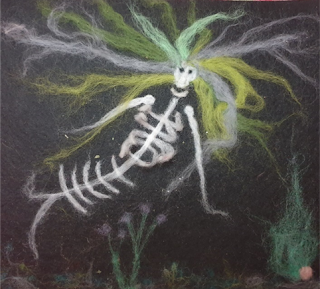Some nights past, after spending time with Cheryl (Maskwa Kôhkomwiy
/ Bear’s Grandmother) talking about economic reconciliation, I heard the Kôhkomwata/Grandmothers
in the dream spaces. They spoke in one voice and echoed the answers given to us
by Elder Barb almost five years ago when we spoke about the practicalities of
writing the “Daring to Meet the Bear” paper. I had asked for her guidance on
the time period and scope of the policy paper. Her response was simple.
“Listen to what
the people have already told you.”
“Go back to the beginning.”
I also felt the Kôhkomach/Grandmothers remind us to find
answers in the practical, a teaching first gifted to Maskwa (Bear) by Elder
Solomon in our third year. I understood how these answers continue to hold the same
truth as when they were first spoken.
I woke to a small sliver of Grandmother Moon illuminating my
sleeping space. I thought about how using a principals/risk based approach to
meet the policy challenges of the pandemic had allowed our programs to be
nimble, to respond to changing situations and unique regional needs. I thought
of how, since the authorities we received were “to fill gaps” in mainstream
programming, that allowed us to think about our programs in new ways and to
address outstanding GBA+ concerns with our funding. I thought about what we
know about our current programs and related challenges. I thought about how
most of our resources go directly to communities already and I thought about
what we could do if we could focus on building a bridge of economic healing, reconciliation
rooted in a truth telling about Indigenous economies. Could that allow us to bypass
the many binaries we face in the current framing of Indigenous economic
development? (Such as high/low capacity, western ideas about time, risk
tolerance) I wondered if the recommendations of the Bear Paper might have some
other ideas on how to build the infrastructures we need to support ISC to meet
it’s goals of service transfer and implement economic reconciliation. I thought
about the abundance of tools in the innovation world and the opportunities they
might provide to try new things and work differently with Indigenous partners
to build sustainable and mutual capacity. I thought of wisdom and knowledges of
the Ancestors that we have forgotten or put aside – the richness of thinking on
these issues we are gifted if we take time to learn.
Most of all I thought of the people (oysin kitayame/ All my
relations). Those we work for and with. Of those who were and will be. The
people who hold the wisdom of their Grandparents. I share these words for the
Bear Bundle and those who are and will join into the Bear Circle. Ho Pehiw/ Nipon
Kona





